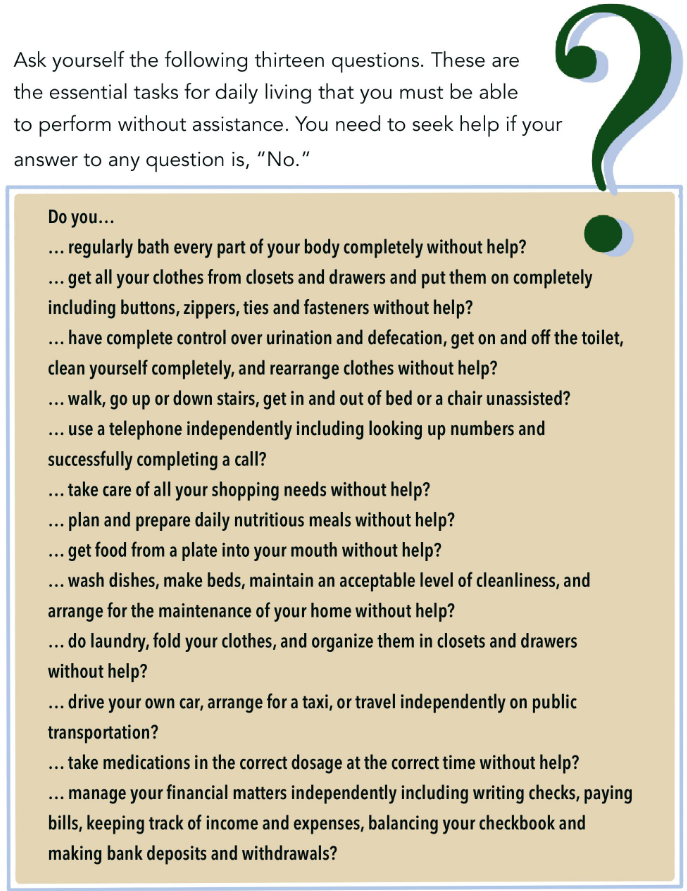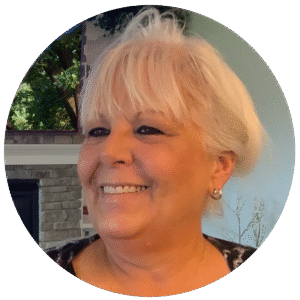Aging happens naturally. It requires no special gift or effort. But the result can be daunting.
If we survive past seventy, eighty, or even ninety, experience teaches us to value the safe places we find in home, family, church and close friends. But all that we treasure most can seem threatened when it becomes a struggle to perform the basic tasks necessary to properly care for ourselves.
We laugh about our forgetfulness and hearing loss. We complain about a lack of energy without seriously considering the consequences. We neglect preparing nutritious meals, bathing, and cleaning the house. Our first falls become closely held secrets. And we don’t talk about the insecurities of driving, especially at night. Deep inside we know these thoughts and actions are not in our best interest.
Options for Aging
What should we do?
First, we should understand that there are options, but ignoring or hiding the problems is the worst option of all.
Hopefully, the information below will provide you with the ability to accurately evaluate your personal situation and make good decisions about the level of care you need, now and in the future.
Problems of Aging
The problems we encounter as we age vary greatly from person to person. Some eighty-year-olds have the physical and mental capacities of someone half their age. Others display significant evidence of decline long before they qualify for Medicare. Now that the first baby boomers are in their seventies, the senior population will grow rapidly over the next few years.
The fastest growing segment of the population will be the eighty-five plus age group. That group is considered to be most at risk and forecast to triple by 2050.
“A longer lifespan can be a double-edged sword. You live for more years, but the later years may not necessarily be what you had in mind. A new study suggests that two-thirds of Americans over age 65 need help doing everyday activities such as eating, bathing, and getting in and out of bed or a chair,”
—Howard E. LeWine, MD, Chief Medical Editor, Harvard Health Publishing
“If I had known I would live this long, I would have taken better care of myself,” is a common cliché heard among seniors. If you are beginning to feel uncertain about your situation, it may be time for an assessment of your own physical and mental condition. You may find the following information helpful as you begin that process. However, you should not rely solely on your own assessment. Discuss your concerns with members of your family, trusted friends, and most importantly with your physician.
Ignoring the early warning signs of physical and cognitive decline could be the worst option of all and result in undesirable consequences.
Things to Consider
“For most older adults, good health ensures independence, security and productivity as they age. Unfortunately, millions struggle every day with challenges such as chronic diseases, falls, physical inactivity, oral health and behavioral health issues – all of which can severely impact quality of life.”
— The National Council on Aging
How well do you perform the normal activities of daily living? “Activities of Daily Living” (ADL) are a group of functions important to our comfort, health and safety. Ability to perform them determines our ability to live alone safely and independently.
Activities of Daily Living include the ability to:
- Move from one position to another, get in and out of bed or a chair and walk independently.
- Shop for groceries, prepare nutritious meals and feed yourself.
- Select appropriate clothing and dress yourself.
- Maintain personal hygiene.
- Control bladder and bowels and use the toilet.
- Obtain medications and take them as directed.
- Keep your environment clean and do laundry.
- Attend events and manage transportation.
- Make purchases, pay bills and manage financial assets.
An entire article could be written on each ADL. But, you should have a general understanding of your ability to adequately perform these tasks after only a cursory review of the list.
Benefits of Assisted Living
Making the decision to move to assisted living may help keep you healthier, safer and even happier. A joyful, positive outlook increases our ability to overcome illness and personal loss, reduces stress and improves our quality of life. You may find that you will truly appreciate the higher level of support and the added opportunities to enjoy social interaction, delicious meals, events, activities, hobbies and peaceful living. And it means you will have a plan of care in place, easing the pressure and concern of your family and loved ones.
Important Questions To Ask Yourself
Instead of looking to specific issues, it may be easier to ask yourself a few pointed questions about your daily activities, health status, functioning capabilities, care needs, and quality of life. It will help you determine whether moving to assisted living is right for you.

If the answers to those questions concern you, it may be time to research assisted living options in your community. You may be surprised by the wonderful opportunities that are available to help you to be more active, vibrant and happy.
Talk to your doctor about a needs assessment to clarify if you are a good fit for assisted living, or if independent living, memory care or a nursing home may be more appropriate for you.
Click here to learn more about Alva Senior Living

